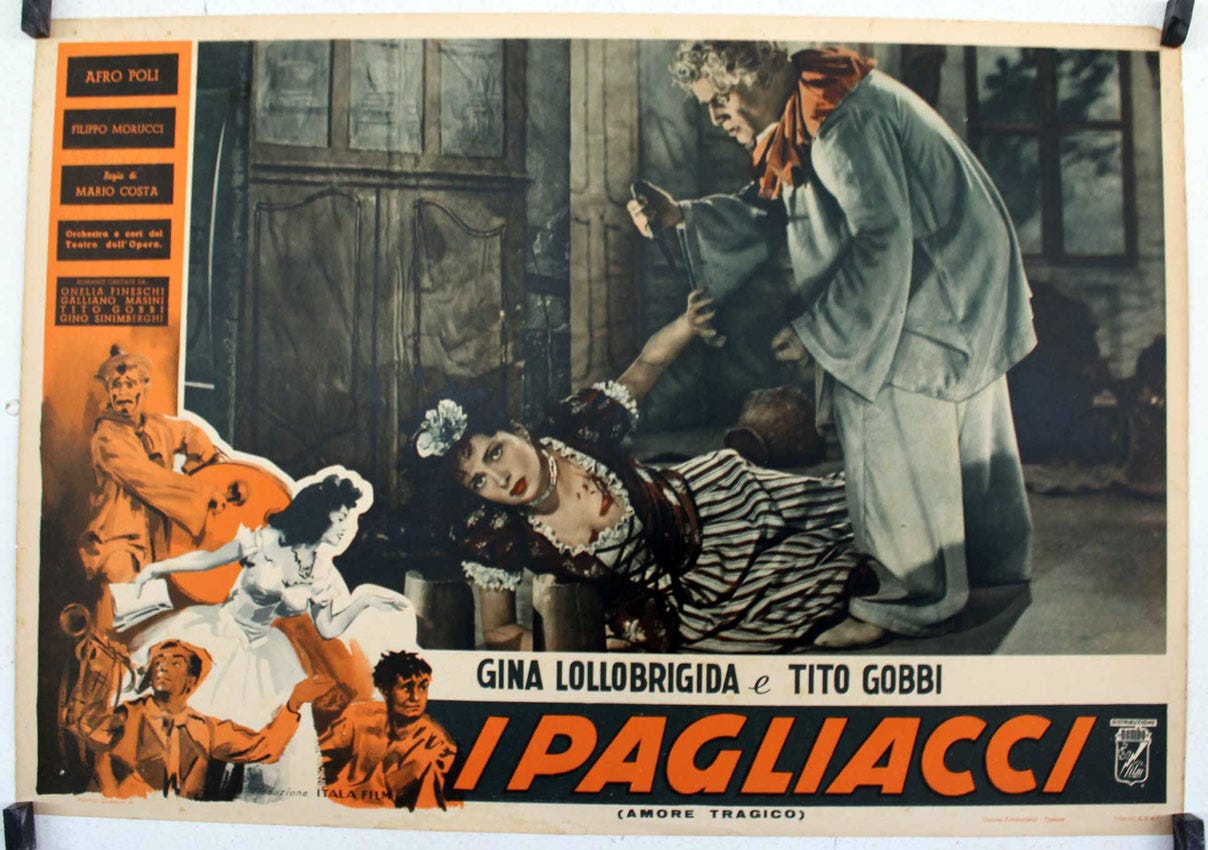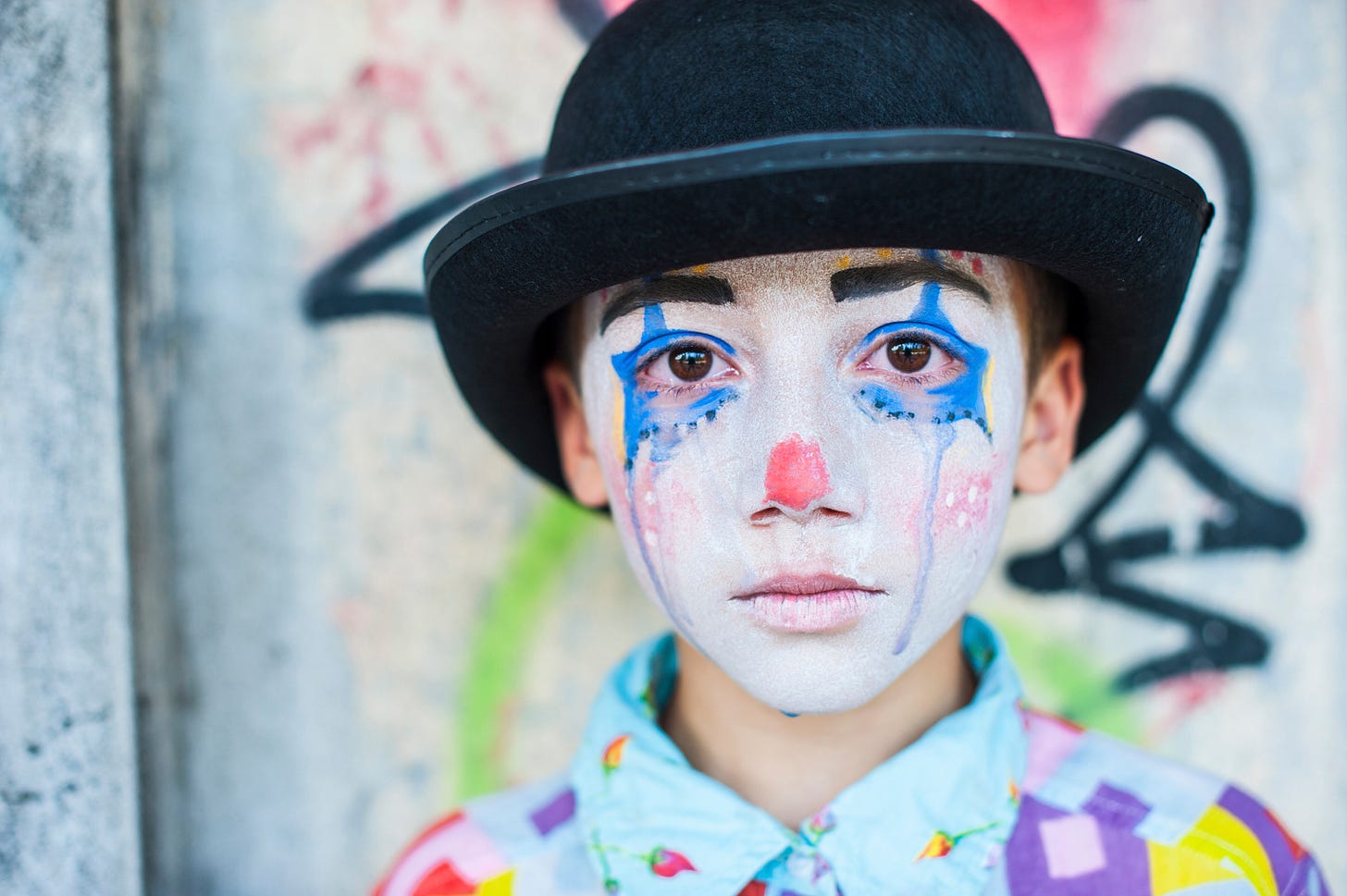But Doctor, I Am Pagliacci
Sadness and comedy: a peek under the armor of real life.
A man walks into a psychiatrist’s office and says, “Doctor, I’m depressed. I’m sad all the time; there’s no hope; life doesn’t seem worth living.” The doctor says, “Go to the theater tonight. There’s a famous clown, Pagliacci, performing, and if you watch him, you won’t be depressed.” The man looks up and says, “But doctor, I am Pagliacci.”
I’ve gotten to the point in my life where I don’t have personal attachments to comedians anymore. They kill themselves too often. It’s like dating men that have good taste in music and only one set of sheets—they’ll break your heart, and you’ll be mad at yourself about it.
It doesn’t shock me when comedians kill themselves or reveal long-standing battles with depression. A funny character who is secretly depressed is so common that it’s cliche, a clown crying beneath the makeup. Being hack hasn’t exactly stopped mental illness, which famously doesn’t care whether it’s trite or not. External happiness or humor is no longer correlated with positive mental health, as Avner Ziv argued was the case in his book Personality and Sense of Humor. This is probably a good thing based on how many jokes I’ve made in therapy during the course of my life; although how many of those jokes were made because they were funny or because I wanted my therapist to think I was funny, who knows? (I do, and I’m not telling.)
Now, some funny people are legitimately depressed. Making other people laugh can be an outlet for darker thoughts in a not-horribly-worrying-your-friends way. It can also be a form of external validation when internal validation is lacking or nonexistent. It’s also a great mask, at least it was, until we turned it into a cliche.
But by and large, this piece is not about funny people with clinical depression because I don’t know what to say other than, “Tony Soprano was on Prozac; if he can do it, you can too.” This piece is about those of us with an undiagnosable personal malaise that never gets in the way of a joke. Why are so many funny people sad?
One answer is that life sucks. But life has always sucked, just in different ways and for different people. That never stopped anyone from being funny; it actually forces community bonding around tragedy. Mel Brooks’ The Producers is seen by some as a tasteless crack at the all-too-recent Holocaust, but the spirit in which he intended it is obvious. If you laugh, you prove you’re still alive, both to yourself and the people who were trying to kill you. Supposedly we’re doomed to repeat history. If we do, I hope we don’t repeat the jokes.
And Now, We Make Funny Things the Subject of Intense Analytic Scrutiny
Humor analysis is reserved for nerds. I say this freely, being one. There’s a difference between people who watch football for fun and people who have a deep statistical understanding of a bunch of grown men giving each other traumatic brain injuries. There’s the same difference between people who like to hear jokes and people like me who take metaphorical scalpels to try to figure out just exactly what is going on.
Incongruity is the dominant method of humor analysis. Something is funny because it is incongruous. Several photos of my younger brother as a baby feature chubby cheeks and a prominently displayed middle finger. Babies aren’t supposed to flip people off; therefore, the pictures are funny. Punchlines of jokes are in some way unexpected, revealing a previously unseen truth: A guy is washing the car with his son. The son says, “Dad, can’t we just use a sponge?” The twist on the use of “with his son” is incongruous with the way we first heard it, therefore, funny. Even if a joke operates within an understood canon, like blonde jokes, the incongruity reveals a canonical truth that is incongruous with normal behavior.
While a joke requires incongruity, it also requires critical distance to use the incongruity properly. Not everything that’s incongruous is funny; it has to be utilized effectively. Steve Allen said that “tragedy plus time equals comedy.” That critical distance can come in many forms, whether it is distance required to craft understanding, distance needed to heal, distance needed to find the right wording. Writers are often discouraged from writing about traumatic experiences while in the midst of them; in a charitable light, this is so they write without turning it into a therapy session; in a more realistic light, it’s so they can write something interesting to anyone outside of their trauma.
That critical distance to craft a joke comes more quickly or more naturally to some. Gilbert Gottfried got enormous flack at the roast of Hugh Hefner because he made a 9/11 joke…18 days after 9/11. He had the critical distance to create a punchline; the audience didn’t have the critical distance to appreciate it (which is by no means a knock on the audience). If good jokes (which the 9/11 joke was) aren’t greeted by equivalent levels of critical distance on the part of the audience, they bomb. The mindset of the room can’t appreciate them, no matter how well-crafted or clever the joke is.
Sometimes the critical distance comes so easily that people make jokes (often very good jokes) in the middle or direct aftermath of a crisis, living by the principle of “if you don’t laugh, you’ll cry.” I, fortunately, can do both at the same time. It is not appealing to see, but it makes me feel better.
Funny people often have access to that critical distance at faster speeds than others. Comedians (who are their own special breed of funny people) often do whole shows about upsetting things; John Mulaney’s recent special, Baby J, is a rumination on addiction and the trap of likability, Hannah Gadsby’s genre-bending Nanette pushes the limits on how to talk/joke about assault, Tig Notaro’s classic “I Have Cancer” bit is exactly that–she had cancer.
By using the incongruities of jokes (even if that joke is standing onstage and saying, “I have cancer”), we can sneak under the armor of real life and poke at the fleshy bits underneath, the vulnerabilities we keep hidden to get through daily life. Tig Notaro had cancer, which is not a particularly funny disease. (On my list of funny diseases, irrespective of their actual severity, are: rickets, chlamydia, thrombosis, and irritable bowel syndrome.)
But the second that Tig Notaro got onstage and said that she had cancer, she could process it with a type of critical distance that can be rather alienating in genuine communication. The event of the joke, the special occasion of a set-up, and a punchline, lets us tell the truth about the world and ourselves in a way we normally are unwilling to.
But that’s just about jokes. If you can land that critical distance, you can make a joke regardless of how you actually feel, and it might be funny. (It’s usually hit or miss with me, so I added “might” in there to make myself feel better.)
That didn’t help Pagliacci, though, did it? He still ended up in a psychiatrist’s office, and that psychiatrist didn’t even recognize him without the makeup.
Life is A ____ (Joke; Party; Never Ending Struggle Reminiscent of Sisyphus Pushing His Boulder Whom We Do Not Need to Imagine Happy Despite That French Guy Saying So; All of the Above)
If jokes require a critical distance, which often presents itself as some sort of emotional or situational clarity, then what’s up with all the crying clowns? Shouldn’t they, of all people, be able to figure it out? Just because someone has the right amount of critical distance to make a joke doesn’t mean the same thing applies to their life. A joke requires a flexible worldview, one that nurtures and pulls out incongruities. What are we the least flexible about? Our own lives.
Many say that people alive today, especially young ones, are more depressed than anyone in history. I have not looked this up because I am one of these depressed young people, and to find out that it’s a generational thing would ruin what little sense of self I have scraped together among bleak economic prospects, crushing rent prices, failing public institutions, and the fact that I’m a Jewish female writer in New York. If you spit in Brooklyn, you hit a different version of me. Probably a taller version, too. And people wonder why we’re sad.
That was a joke about my life right there. Whether it was a good one or not, I’ll let you decide (but if you think it wasn’t, I have no interest in hearing from you). Feeling unoriginal, feeling impoverished financially and emotionally, feeling stuck…it’s all bleak stuff. But I made a joke about it. I have enough wherewithal, enough critical distance to make it humorous. But do I have the critical distance, never mind the wherewithal, to do anything about it?
And that’s what funny people run into (note how I’m lumping myself in with that group). Say what you want about modern life in the West, its trappings and its grandeur, but we feel overwhelmingly alone. We feel stuck. We’ve created a culture dominated by individualism, one that is almost antithetical to the community we’ve had in the past.
True community, involved community, means taking a step back from yourself and helping others. It means giving pieces of yourself, not giving them up, but sharing them. It means making the time and effort to center something else other than yourself. Community demands flexibility. The overwhelming worldview right now that life is solitary, nasty, brutish, and short doesn’t. It prizes rigidity, it prizes isolation; it prizes never getting out of yourself.
What does a joke require? Flexibility. Distance. And an audience. What do we give ourselves as human beings? Not that.
If we treated life more like a joke, something demanding flexibility, reflection, workshopping, practice, and the occasional foray into bad taste, maybe we wouldn’t have so many sad, funny people. If we take the opportunity to see ourselves as something other than a pawn of a random and unfriendly world and revel in the incongruities of life around us, what more could we laugh at?
If Pagliacci applied the same makeup to the world as he does to his face, would he have needed to go see the doctor? Maybe he would have since Pagliacci might have depression and good health care through the UCWU (United Clown Workers Union). But at least, would the doctor have recognized him?







You don't want to hear this from ME. Zen slap.